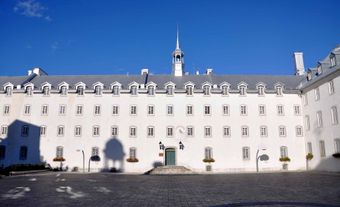Musical Education
Houdy began his musical education at the Rennes Conservatory when he was seven years old. In 1939, he was admitted to the Paris Conservatory, where he studied with Marguerite Long, Lazare Lévy, Noël Gallon, Maurice Duruflé, Messiaen, Milhaud, and Nadia Boulanger.
Personal Life
Houdy moved to Quebec City in 1971 alongside his wife, (Marie Geneviève) Ghislaine de Winter, harpist, teacher as well as recipient of the Premier prix de harpe at the Paris Conservatory, in 1955. The couple became naturalized Canadians in 1976, six years after settling in Canada, where they resided until 1992. Houdy and his wife had four daughters.
Career
Houdy occupied a variety of roles in the industry of classical music. He was director of the Tours Conservatory (1955-1960), teacher at the Schola cantorum (1963-1964), choirmaster of St-Séverin Church in Paris (1965-1969), and choir conductor of the Maîtrise d’enfants of the Office de radiodiffusion-télévision française (ORTF) (1966-1969). He then led a highly diversified career, divided between concert tours in Europe and composition.
Invited to Quebec City in 1970 by Laval University (see Music at Laval University), he was appointed teacher of composition and theory (1970-1971). He then taught composition and writing at the Conservatoire de musique du Québec (CMQ) (1971-1992). His pupils in Quebec have included Denis Bédard, Daniel Bolduc, Richard Gagné, Guy Gingras, and Alain Leblond. He was also an associate of the Canadian Music Centre.
Houdy remained faithful to traditional musical language and his constant concern with communicating a human view of perceived reality has been brought to bear on a wide range of assignments.
Of Houdy's more than 150 scores, the first, À mes petits amis, a set of piano pieces, was published by Lemoine in Paris in 1938. He also wrote about 100 short choral pieces a cappella or with instrumental accompaniment (1949-1982), 5 masses including the Messe bretonne (1981), 6 cantatas and oratorios including the Cantate à saint Michel (1966), some stage and film music, including Bach et Bottine (1986), about 40 chamber works (1936-1990) and 8 orchestral works, notably Les Aveugles de Breughel (1967), and 4 electroacoustic works. Most of his compositions, including the Sonate for harp (1954), which appears at most international competitions, were published by Leduc.
In those works inspired by the Quebec environment he has paid homage to the violoneux with his Messe québécoise (1973) for mixed voices, violin, double-bass, and spoons (Éditions Pierick Houdy 1976, London LOS-26604); to Indigenous peoples on reserves with Kastchentamoun (1974) for saxophone, piano, and tape; and to the pioneers of New France in his Témoignage de Marie de l'Incarnation (1984), commissioned by the Concerts Couperin, and his Messe de Jacques Cartier (1984), commissioned by the CBC. He also wrote a work for choir and orchestra (1975-1976) about St. Jean-Baptiste, a hymn to Teilhard de Chardin for speaker and orchestra (1982, recorded on RCI 549 by a CBC ensemble in Quebec under the composer's direction), a saxophone quartet Chemins (Billaudot 1977) and Cinq caractères en forme d'études for two saxophones (Doberman-Yppan 1988, recorded on Cibé 700115).
Houdy returned to France in 1992 to pursue his career as a teacher until his death in March 2021.
Honours and Awards
- Second grand prix de Rome (1953)
- Grand prix musical de la ville de Paris (1954)
- Prix Emmanuel Chabrier (1954)
- Premier prix de composition, Paris Conservatory (1954)
- Best Canadian choral recording (Messe québécoise), Canadian Music Council (1979)

 Share on Facebook
Share on Facebook Share on X
Share on X Share by Email
Share by Email Share on Google Classroom
Share on Google Classroom


